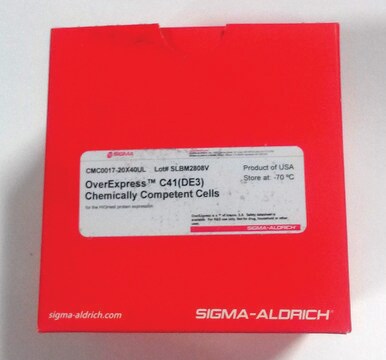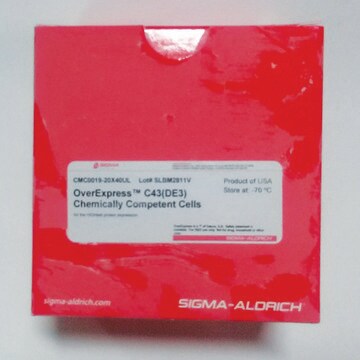70837
Origami B(DE3) Competent Cells - Novagen
Escherichia coli, rod shaped
Synonym(s):
Competent cells, Novagen competent cells
About This Item
Recommended Products
product name
Origami B(DE3) Competent Cells - Novagen, Origami B host strains carry the same mutations as the original Origami strain, except that they are derived from a lacZY mutant of BL21 to enable precise control of expression levels using IPTG.
biological source
Escherichia coli
Quality Level
manufacturer/tradename
Novagen®
storage condition
OK to freeze
growth mode
adherent or suspension
morphology
rod shaped
technique(s)
microbiological culture: suitable
cell transformation
transformation efficiency: >2×106 cfu/μg
shipped in
dry ice
storage temp.
−70°C
General description
This product contains genetically modified organisms (GMO). Within the EU GMOs are regulated by Directives 2001/18/EC and 2009/41/EC of the European Parliament and of the Council and their national implementation in the member States respectively. This legislation obliges us to request certain information about you and the establishment where the GMOs are being handled. Click here for Enduser Declaration (EUD) Form.
DE3 indicates that the host is a lysogen of λDE3, and therefore carries a chromosomal copy of the T7 RNA polymerase gene under control of the lacUV5 promoter. Such strains are suitable for production of protein from target genes cloned in pET vectors by induction with IPTG.
Components
•2 × 0.2 ml5 × 0.2 mlOrigami B(DE3) Competent Cells
•2 × 2 ml4 × 2 mlSOC Medium
•2 ng2 ngTest Plasmid
Warning
Legal Information
Storage Class Code
10 - Combustible liquids
WGK
WGK 2
Certificates of Analysis (COA)
Search for Certificates of Analysis (COA) by entering the products Lot/Batch Number. Lot and Batch Numbers can be found on a product’s label following the words ‘Lot’ or ‘Batch’.
Already Own This Product?
Find documentation for the products that you have recently purchased in the Document Library.
Our team of scientists has experience in all areas of research including Life Science, Material Science, Chemical Synthesis, Chromatography, Analytical and many others.
Contact Technical Service

